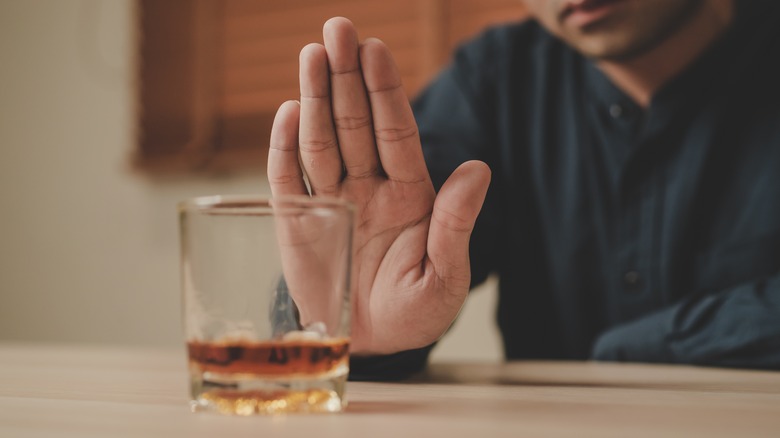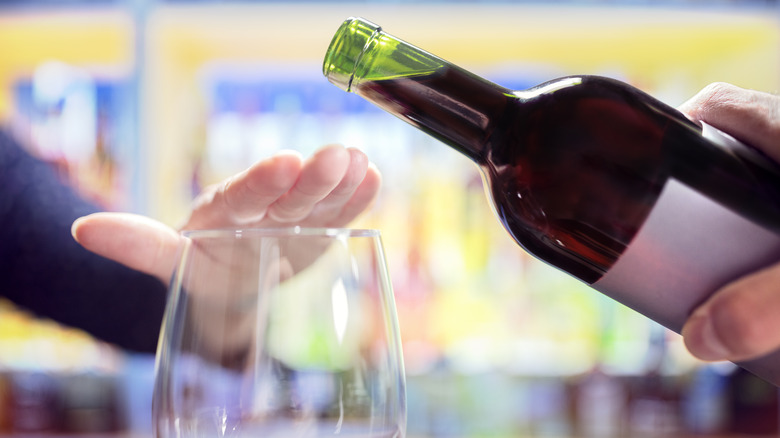Could This Heart Disease Pill Help With Alcohol Cravings?
Alcohol use disorder (AUD) affected about 14.5 million people in the United States as of 2019, according to the National Institute on Alcohol Abuse and Alcoholism (NIAA). Binge drinking can increase your risk of AUD, which for women is consuming four or more drinks or men having five or more drinks within two hours. Heavy alcohol use can also increase your risk for AUD. Heavy alcohol use is drinking three drinks on any day or seven drinks a week for women. For men, heavy drinking means having four drinks on a given day or 14 drinks per week.
The NIAA considers AUD to be a brain disorder because people with the disorder can't stop drinking despite negative consequences. According to a 2012 study in Science Translational Medicine, drinking alcohol taps into the reward centers in the brain. Given the same amount of alcohol, heavy drinkers release more feel-good chemicals than casual drinkers, which means heavy drinkers get more pleasure out of alcohol.
The NIAA says that people can recover from AUD with a combination of therapy, support groups, and medication. A 2022 study in Molecular Psychiatry has found that spironolactone — a drug typically used for heart failure — can actually help people reduce their drinking.
Spironolactone reduced alcohol consumption
Mineralocorticoid receptors (MR) maintain the balance of water and electrolytes like sodium in the body, according to the National Institute on Drug Abuse. However, they might also play a role in alcohol consumption. Because spironolactone blocks mineralocorticoid receptors, the 2022 study in Molecular Psychiatry sought to see its effects on alcohol dependence.
At first, the researchers tested spironolactone on mice and rats, finding that the drug reduced their consumption of alcohol. The researchers also compared the health records of patients prescribed spironolactone and those who weren't (per National Institute on Drug Abuse). People who took spironolactone also reduced their drinking, with the biggest reductions among people who were considered to be heavy drinkers.
A 2021 study in Neuropsychopharmacology also compared the drinking habits of 523 people who took spironolactone with 2305 people who didn't. People taking spironolactone reduced their weekly alcohol totals by 3.5 drinks. People who consumed more than seven drinks a week reduced their consumption by about four drinks.
Other treatments for alcohol use disorder
The study's results are promising, which is important, as one of the study's authors told Everyday Health that more drugs are needed to help people who suffer from alcohol use disorder. Current medications for AUD include naltrexone, acamprosate, and disulfiram. Naltrexone blocks the pleasure receptors in the brain associated with alcohol and can curb alcohol cravings in some people, according to Medline Plus. Like naltrexone, acamprosate works in several parts of the brain to fight cravings after you stop drinking. Disulfiram discourages drinking by causing people to feel nauseated while consuming alcohol.
According to Medline Plus, cognitive behavioral therapy can address the thoughts and triggers that cause you to drink. It also includes ways to cope with stress. Family therapy can also address family relationships so that they can provide a support network in your desire to stop drinking.
Peer support groups such as Alcoholics Anonymous can provide additional support for people seeking to address their alcohol use (via National Institute on Alcohol Abuse and Alcoholism). It's best to start with your doctor to find the proper course for treatment.



